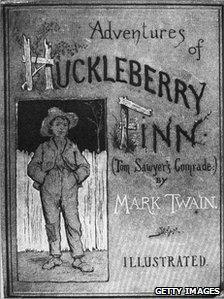Furore over 'censored' edition of Huckleberry Finn
- Published

A new edition of Mark Twain's Adventures of Huckleberry Finn is causing controversy because of the removal of a racially offensive word.
Twain scholar Alan Gribben says the use of the word "nigger" had prompted many US schools to stop teaching the classic.
In his edition, Professor Gribben replaces the word with "slave" and also changes "injun" to "Indian".
But the publisher says hundreds of people have complained about the edits.
First published in 1884, Huckleberry Finn is considered one of the great American novels.
While telling the story of a boy's journey down the Mississippi River some time between 1835 and 1845, the novel satirises Southern attitudes on race and slavery.
History of controversy
"The book is an anti-racist book and to change the language changes the power of the book," said Cindy Lovell, executive director of The Mark Twain Boyhood Home and Museum in Hannibal, Missouri.
"He wrote to make us squirm and to poke us with a sharp stick. That was the purpose," she told Reuters news agency.
The novel has often been criticised for its language and characterisations and it is reported to be the fourth most banned book in US schools.
The "N-word" appears 219 times in the story.
Professor Gribben, who teaches English at Auburn University Montgomery in Alabama, said he had given many public readings of Twain's books - and that when he replaced the word with "slave", audiences were more comfortable.
He said he wanted more people, especially younger people, to be encouraged to read the novel.
"It's such a shame that one word should be a barrier between a marvellous reading experience and a lot of readers," he said.
But the idea has been condemned by other scholars, teachers, writers and rights activists.
"Trying to erase the word from our culture is profoundly, profoundly wrong," said Randall Kennedy, a Harvard Law School professor.
Dr Sarah Churchwell, a lecturer on American literature, told the BBC that it made a mockery of the story.
"It's about a boy growing up a racist in a racist society who learns to reject that racism, and it makes no sense if the book isn't racist," she told BBC World Service's Newshour programme. "You can't make the history of racism in America go away."
Power of words
Twain himself was very particular about his words.
He is quoted as saying that "the difference between the almost right word and the right word is really a large matter".
And when a printer made punctuation changes to A Connecticut Yankee in King Arthur's Court, Twain wrote later that he had "given orders for the typesetter to be shot without giving him time to pray".
The publisher of this new edition of Huckleberry Finn, New South Books, says dozens of people have telephoned to complain and hundreds have sent e-mails.
The press have also weighed in to the debate, generally in defence of the original version.
"What makes Huckleberry Finn so important in American literature isn't just the story, it's the richness, the detail, the unprecedented accuracy of its spoken language," the New York Times said in an editorial. "There is no way to 'clean up' Twain without doing irreparable harm to the truth of his work."
In the UK, an editorial in The Times called the new edition "a well-intentioned act of cultural vandalism and obscurantism that constricts rather than expands the life of the mind".
The sanitised version will be published on 15 February, in a joint reissue with The Adventures of Tom Sawyer, which also has the offensive epithets replaced.
- Published27 September 2010
- Published17 May 2007